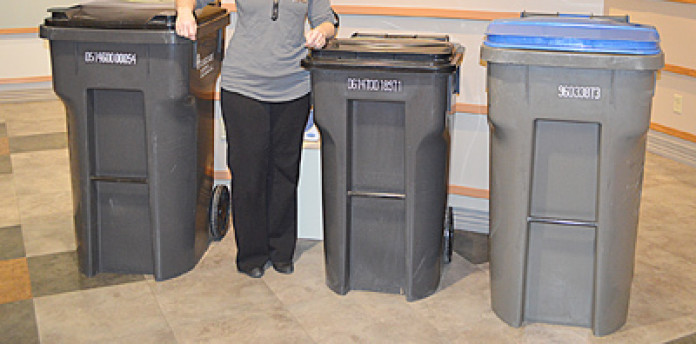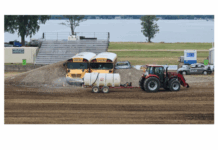
The City of Warsaw is working to make sure its trash removal changes go as smoothly as possible, according to Mayor Joe Thallemer.
Yellow wire tags were placed on trash containers in the city this week for residents to decide if they want the new 64- or 96-gallon size. Residents are asked to circle their preferred size, write their address on the tag then put the tag back on the container for the Public Works Department to pick them up as it collects trash next week.
Thallemer said after the tags are collected, the city will figure out how many cans of each size it needs.
“Going to an automated system, we are able to use larger containers. Currently, the city uses a 32-gallon as the maximum size, and obviously with the 64 that’s twice the volume and the 96 is three times the volume,” Thallemer said.
Any family that typically uses two trash containers should probably select the 96-gallon can, he suggested. Both sizes should be easy to navigate as they have wheels on the bottom of them.
“The whole idea with these larger containers is to keep everything in one container; with a larger container that’s not going to blow over that’s got a lid on; we don’t have loose bags laying around,” Thallemer said. “With the automated equipment, we’re going to need everything to be in one container so when we come by, just what’s in the large container, the Tote, is what we’re going to pick up.”
The city will continue to pick up separate items that it has in the past. Yard waste will still be picked up as it has been with the follow truck.
“But the automated truck will be picking up strictly garbage in the Totes. So, again, we want all the citizens to have a Tote that will meet their needs. The 96-gallon Tote, we feel, will be what the majority will select, and that’s identical to what’s being used right now with recycling,” Thallemer said.
Trash will continue to be picked up on a weekly basis. If a person uses two or even 2-1/2 trash cans in a week, Thallemer said a 96-gallon can will continue to handle that because the city will pick trash up with the frequency – once a week – that it does now.
“I would say singles or maybe couples who are smaller and don’t use as much trash and recycle a lot will probably be OK with the 64-gallon. But, we want to try and not be swapping out containers. We’d like for everybody to try and make the best selection upfront because it’s going to be a big changeover, and we want people to get what they think will work for them the best,” he said.
When the city distributes the new trash cans, which are city property, it will run a truck to pick up the old cans for anyone who wants to dispose of them.
Recycling, which the city has been doing for many years, is a big part of the changeover. Many citizens take advantage of the recycling program, which “really cuts down on the trash to the landfill,” the mayor said.
“One Tote should be adequate for families that recycle. If someone isn’t recycling, they can call the street department and get put on the list. We’ll drop off a Tote for recycling as well, which, again, is a separate program,” he continued.
The changes to the city’s trash program won’t occur for several months, with Thallemer estimating it could be April or May when the new cans are delivered.
“Our new truck should be here within a couple of weeks, and the Totes will start arriving, and we have to assemble the Totes,” he said. “So we will use an automated truck, which will only require one individual to operate. Currently, we operate with a driver and two of our sanitation workers are on the back.”
The city typically runs two trucks with a total of six employees out running the trash routes.
“Theoretically, this can operate with just one individual. The individual that drives it is able to automate with the arm and pick up. But, we’ll be continuing to use a standard truck with a tipper on the back so we can tip these larger Totes. We don’t allow our workers to lift anything heavier than the 32-gallon 40-pound limit, and the current trash truck will have to be retrofitted with a tipper on the back, which it can do. So it may require only two individuals to operate that truck instead of three,” Thallemer explained.
The new recycling contract approved recently by the Board of Public Works and Safety gave the city the optional bid of saving $40,000 by putting everything out by the curb instead of in alleyways. Thallemer said it was decided to do that all at once with the trash, so once everything is put into place the trash and recycling both will be picked up at curbside.
“I want to note, and it’s important to stress, that the curbside, for most people, most convenient will be at their front curb, but folks that live toward the end of a street can also take it out to a side street,” he said.
“It’s critical, from a safety standpoint and a cost-savings standpoint, that we move to this automation,” he said.
Getting trash and recycling out of the alleys will help preserve them, and it will be easier and more efficient for the city workers to get the routes done. The larger, automated truck would have a difficult time navigating through the alleys.
“The equipment is larger, it’s tough to navigate the alleyways, safety becomes an issue, and, of course, the alleys are only made up of a couple of inches of asphalt. It tears the alleyways up,” Thallemer said.
The changes will take a little time for everyone to get used to, he said, so the city requests everyone’s patience in the matter. “We’re certainly going to do everything we can to make it easier,” he noted.
The automation is being done for cost savings, possibly reducing the manpower needed for trash routes from six men down to two, though that won’t happen right away.
Warsaw is one of a few communities that doesn’t have a garbage fee, and Thallemer said the city would like to keep it that way.
“It’s a big part of why we’re trying to cut our costs,” he said. “We know that our general fund is stressed, and there are many services that we need to provide, and this is an area that we can really make some headway as far as cost savings without implementing a trash fee.”
Thallemer said most communities have a trash fee or don’t even provide pick-up. It’s a $40 to $50 service that Warsaw provides without a fee. Property taxes do go toward the trash removal service, but most communities have a fee to supplement that because of the obvious costs associated with the heavy equipment and garbage trucks have a short life span.
“In the past, garbage removal has been very labor intensive. Most communities are moving toward the automation,” he said. “We’re jumping into it and we’re pretty excited about it.”
Thallemer said the city decided against contracting the service out because it knows its citizens and can stop and help them if there’s a problem.
“If there’s problems, we want to take care of them. Our committee felt like it made sense for the city to continue to offer the service because we know our citizens and we know what they’ve come to expect, and we don’t think we can get the level of service a contractor would provide,” he said.
The mayor said the city hopes that everyone will be patient. There will be some “bugs” along the way, but the city will work with its residents during the process.
(Story By The Times Union)




